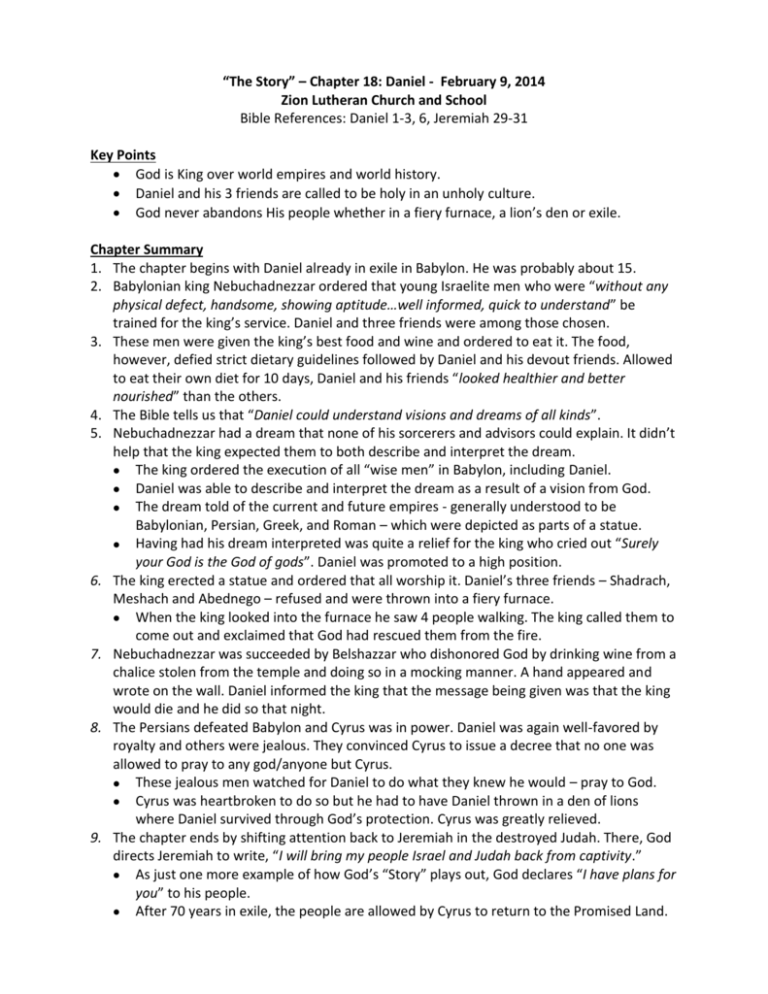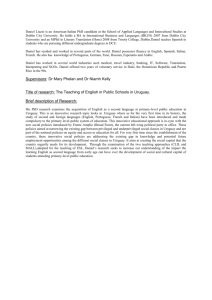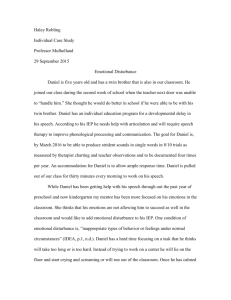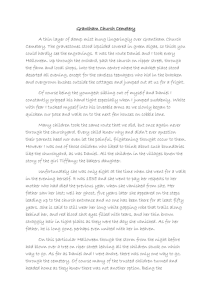“The Story” – Chapter 18: Daniel - February 9, 2014 Zion Lutheran
advertisement

“The Story” – Chapter 18: Daniel - February 9, 2014 Zion Lutheran Church and School Bible References: Daniel 1-3, 6, Jeremiah 29-31 Key Points God is King over world empires and world history. Daniel and his 3 friends are called to be holy in an unholy culture. God never abandons His people whether in a fiery furnace, a lion’s den or exile. Chapter Summary 1. The chapter begins with Daniel already in exile in Babylon. He was probably about 15. 2. Babylonian king Nebuchadnezzar ordered that young Israelite men who were “without any physical defect, handsome, showing aptitude…well informed, quick to understand” be trained for the king’s service. Daniel and three friends were among those chosen. 3. These men were given the king’s best food and wine and ordered to eat it. The food, however, defied strict dietary guidelines followed by Daniel and his devout friends. Allowed to eat their own diet for 10 days, Daniel and his friends “looked healthier and better nourished” than the others. 4. The Bible tells us that “Daniel could understand visions and dreams of all kinds”. 5. Nebuchadnezzar had a dream that none of his sorcerers and advisors could explain. It didn’t help that the king expected them to both describe and interpret the dream. The king ordered the execution of all “wise men” in Babylon, including Daniel. Daniel was able to describe and interpret the dream as a result of a vision from God. The dream told of the current and future empires - generally understood to be Babylonian, Persian, Greek, and Roman – which were depicted as parts of a statue. Having had his dream interpreted was quite a relief for the king who cried out “Surely your God is the God of gods”. Daniel was promoted to a high position. 6. The king erected a statue and ordered that all worship it. Daniel’s three friends – Shadrach, Meshach and Abednego – refused and were thrown into a fiery furnace. When the king looked into the furnace he saw 4 people walking. The king called them to come out and exclaimed that God had rescued them from the fire. 7. Nebuchadnezzar was succeeded by Belshazzar who dishonored God by drinking wine from a chalice stolen from the temple and doing so in a mocking manner. A hand appeared and wrote on the wall. Daniel informed the king that the message being given was that the king would die and he did so that night. 8. The Persians defeated Babylon and Cyrus was in power. Daniel was again well-favored by royalty and others were jealous. They convinced Cyrus to issue a decree that no one was allowed to pray to any god/anyone but Cyrus. These jealous men watched for Daniel to do what they knew he would – pray to God. Cyrus was heartbroken to do so but he had to have Daniel thrown in a den of lions where Daniel survived through God’s protection. Cyrus was greatly relieved. 9. The chapter ends by shifting attention back to Jeremiah in the destroyed Judah. There, God directs Jeremiah to write, “I will bring my people Israel and Judah back from captivity.” As just one more example of how God’s “Story” plays out, God declares “I have plans for you” to his people. After 70 years in exile, the people are allowed by Cyrus to return to the Promised Land. Additional Information and Comments 1. Daniel served as a living testimony to faithful living in a pagan society. He modeled godliness to both the faithful and the unfaithful Judeans in Babylon. 2. Daniel often spoke in soft, measured words when facing a difficult situation. For example, when the king’s guard was preparing to carry out Daniel’s ordered execution, Daniel spoke to him “with wisdom and tact”. Daniel shows that speaking the truth does not need to be done in a caustic, argumentative way. 3. Daniel’s three friends are thrown in a furnace as a way of saying “this is what happens to you when you don’t worship the king”. The protection of the three, however, is God essentially saying “This is what happens to those who are loyal to and worship Me”. Discussion 1. What would you say are the core personal qualities that Daniel and his friends exhibit in this chapter? (For example, courage and devotion to God are two obvious ones.) 2. In many ways Daniel is unlike other OT prophets such as Elijah or Isaiah. In what ways would you say he is different? Can you think of ways he is similar? 3. In chapter 18, Jerusalem and God’s Temple were in ruins and most of the Jews were living in exile. It is easy to see how they could despair and their trust in God could be strained. Can you think of a time when you felt your trust in God being strained? If so, what did you do in response? 4. Look back at God’s covenant with Abraham (p. 13 or Gen. 12:1-3). How was it fulfilled through Daniel and his three friends? 5. Compare the story of Daniel with the story of Joseph in Egypt. Discuss the difficulties each faced. How did each approach his specific difficulties? 6. List the various ways that God revealed His supernatural power in this chapter. What message did God’s actions send to the exiles? What impression did He make on the gentile leaders? 7. When Shadrach, Meshach, and Abednego refused to bow down to the golden idol, they did not know whether God would save them from the fire or not, still, they did God’s will. Can you recall a time when you stood up for God knowing the result could be difficult? 8. How did Daniel regard the various governmental authorities? Look up Romans 13:1-7, 1 Timothy 2:1-2, and Titus 3:1. How should Christians regard governments? (Do you recall what Luther said regarding government/governmental authorities?) 9. How did God show Himself to be sovereign over human kingdoms and rulers? How does this help you view our world today? 10. Jeremiah’s message (p. 260-261) was sent in a letter to the exiles in Babylon. What were God’s Lower Story (little picture) and Upper Story (big picture) promises to them? 11. What are some specific ways the stories of Daniel and his friends would have encouraged the Israelites in exile? For Next Week 1. Daniel and his friends had each other for support. Take time to consider who you have for support in difficult times and thank them.








